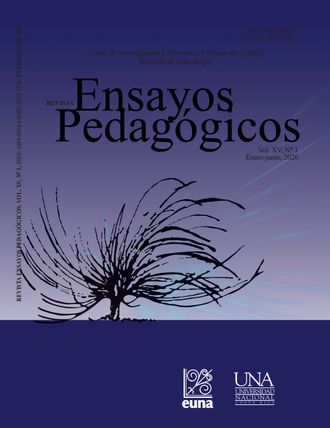The Importance of Otherness in the Teaching of Religion in School: The Great Challenge for the Teacher
DOI:
https://doi.org/10.15359/rep.15-1.5Keywords:
otherness, alterity, dialogic philosophy, culture, interculturality, multireligiousness, interreligiousness, communion, peace, deconstruction, pedagogical mediation, inclusive education, equity, equalityAbstract
By looking around, it is possible to realize that what happens in the classrooms is the consequence of the society in which it is embedded. Interpersonal relationships, frequently damaged by different circumstances, are weakened as time goes by ending in complete indifference towards other people or aggression that is impossible to prevent. It seems that Religion as a subject cannot tear down these walls of individualism, and consequently, it is not succeeding in its attempt to create peace and bring people together. It is time to question our actions as social agents and educators to achieve a real change for all of us. In order to do this, the first proposal is to recognize ourselves as we are; only then can we recognize the others. In that way, we may act as real bridge builders to motivate the dialogue that leads to peace.
References
Armijo-Cabrera, M. (2018). Deconstruyendo la noción de inclusión: un análisis de estudios, políticas y prácticas en educación. Revista Electrónica Educare, 22 (3), 1-26. https://doi.org/10.15359/ree.22-3.8
Blanchar, C. (2003). El teólogo Hans Küng asegura que no habrá paz entre las naciones “sin paz entre las religiones”. Diario El País de Barcelona. Recuperado de https://elpais.com/diario/2003/11/12/sociedad/1068591614_850215.html
Bolaños, R. (2010). Elementos de alteridad y convivencia social a partir de la Filosofía Dialógica de Martin Buber. Sophia: Colec. de Fil. de la Educ., 8, 11-31 Recuperado de https://dialnet.unirioja.es/servlet/autor?codigo=4234999#ArticulosRevistas
Buber, M. (1993). Il Principio Dialogico e altri saggi, trad. it. di A. M. Pastore, con un saggio introduttivo, e apparato critico e commento di A. Poma. Milano: Edizioni San Paolo.
Concilio Vaticano II. (1965). Gaudium et Spes. Constitución Pastoral sobre la Iglesia en el mundo actual. Buenos Aires: Ediciones Paulinas.
Diccionario de la Real Academia Española. (2018). Recuperado de https://dle.rae.es/?w=diccionario
Esquivel, J. (2013). Narrativas religiosas y políticas en la disputa por la educación sexual en Argentina. Revista Cultura & Religión, 7(1), 140-163. Recuperado de http://www.revistaculturayreligion.cl/index.php/culturayreligion/article/view/371/319
Ocampo, A. (2018). Condiciones de producción de la Educación Inclusiva. Revista Pedagógica, 20 (45), 134-161. http://dx.doi.org/10.22196/rp.v20i45.4606
Ronchi, E. (2016). Jesús no es moralista, nosotros hemos moralizado el Evangelio. Meditaciones en los Ejercicios Espirituales que dio al Papa Francisco y a la Curia. Agencia de noticias Zenit del Vaticano. Recuperado de https://es.zenit.org/articles/jesus-no-es-moralista-nosotros-hemos-moralizado-el-evangelio/
Published
How to Cite
Issue
Section
License
Ensayos Pedagógicos is subscribed to the Attribution-NonCommertial-NoDerivatives 4.0 International Creative Commons Licence, which allows both authors and readers to freely download, store, copy, and distribute the final approved publisehd version of the manuscript (post-print) as long as this is done without commercial purposes, no derivative works are generated, and the source and author are mentioned. As well, Ensayos Pedagógicos declares that authors will remain the rightful owners of the copyrights of their work in perpetuity.







